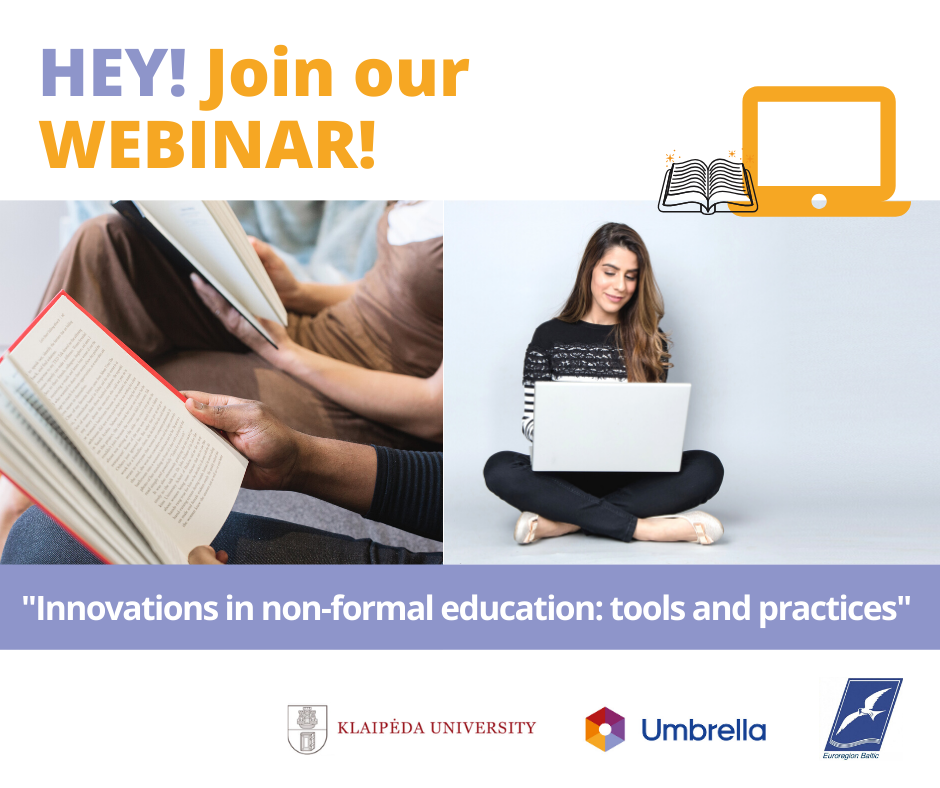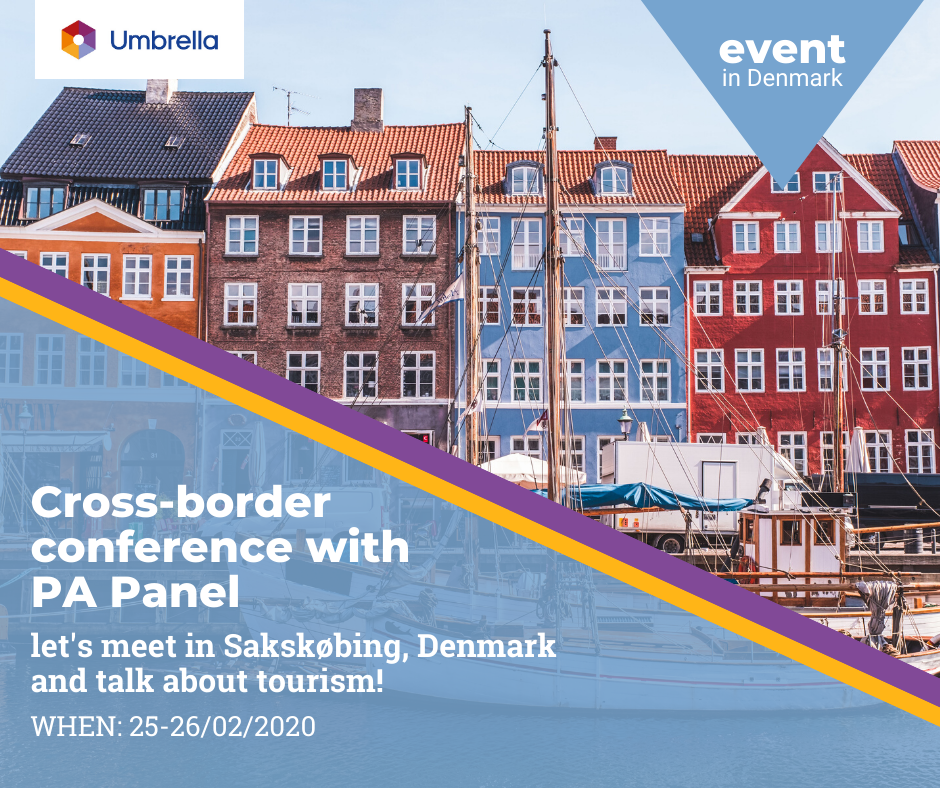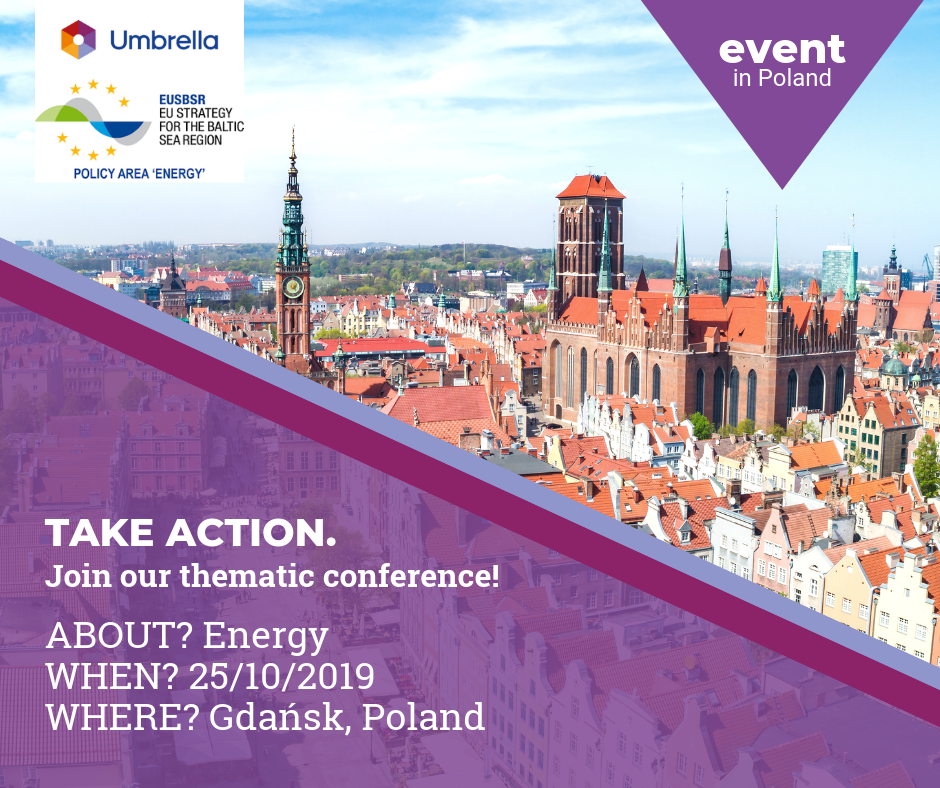On September 02, 2020, despite the still ongoing corona situation with all its restrictions and conditions, a study trip of a Danish delegation, led by Hilary Karlson and Mette Jorgenson from the Bio-Economy Hotspot Guldborgsund, could be carried out in the Interreg Project Umbrella, while adhering to strict hygiene measures.
(more…)AGRI-AQUA INNOVATION STUDY TOUR

3, 2, 1… – time for the next webinar! Join us on Monday and learn something about innovations in non- formal education.
? “Innovations in non-formal education: tools and practices”
?♂ Expert – Ugnius Savickas
? On the 22nd of June
⏰10:00-12:00 CET and 11:00 – 13:00 (LT time)
We will discuss:
– learning style role in education;
– global teaching novelties;
– impact measuring at non-formal education;
?Registration: https://forms.gle/tWCMhWmBFPJnRRRe8


We are happy to invite you to our 2nd microactivity in the form of a webinar on 16th June 2020 organized by our Partner, Kalmar Region County. This time we will discuss the youth issues and Agenda 2030.
Our expert will be Ms Therese Mithander Udovcic from Sweden. Therese is an expert with advice and support on transnational cooperation and project development in the Baltic Sea Region.
On the 16th of June, we will have the opportunity to gather around initiatives and project ideas on Youth and Agenda2030.
- Experience in designing and implementing projects
- Idea generation on new projects
- Open calls targeting Youth and Agenda2030
- Curation of stakeholders
Please click here: https://docs.google.com/forms/d/e/1FAIpQLSflcTtA-oGGuwiCIShb-LWVNv1-Var0CFUL8H3RYdP3yAQdXg/viewform to register to the webinar scheduled on 16th June, 13.00-15.00 CET.
Participation is free of charge.
Right after you submit this form, you will receive a confirmation email. Link to Zoom platform will be sent to You on 16th June, 2020.
This webinar is one of the events framed into UMBRELLA project (co-financed by the INTERREG V-A South Baltic programme 2014-2020)

The study visit in the Umbrella project framework took place in November 2019, but we decided we should present you the outcomes, as it was a very fruitful and exciting meeting for our participants.
Report from Swedish Study Trip to Guldborgsund Municipality, Denmark 12/11/19 – 14/11/19 – prepared by Daniel Granello.
Background
Kalmar County is characterized by low population density and large rural areas. Many of these areas are dealing with challenges, such as depopulation and lack of employment opportunities.
Kalmar county consists of 12 municipalities and Region Kalmar County organizes a network of rural developers. Within the network, common challenges and experiences are discussed. Likewise, the public officials have many contacts and exchange of experiences with other municipalities, counties and organizations in Sweden. The contacts with organizations outside Sweden are, however, limited.
Danish society has many common traits with Swedish society. Likewise, the challenges in rural areas are often common in Denmark and Sweden.
Within the Umbrella project, Interreg SBP, a study trip was organized to Guldborgsund municipality in southern Denmark, where rural developers from Kalmar County and Guldborgsund municipality could meet and exchange experiences and discuss common challenges and possibilities for common projects.
Participants from Sweden
- Kalmar County Administrative board
- Högsby municipality
- Mörbylånga municipality
- Oskarshamn municipality
- Region Kalmar County
- Västervik municipality
Participants from Denmark
- Gulborgsund municipality


Programme
12/11/19 18:00 Welcome dinner
13/11/19 09:30 Welcome to Guldborgsund municipality,
Presentation- Rural development in Guldborg municipality
Anna Topp Gustavsen and Carina Woolhead from Gulborgsund municipality gave a presentation about Guldborgsund municipality and the organization of the rural development initiatives. In many ways, the situation in Guldborgsund is similar to the situation in Kalmar county, yet there are also some big differences, such as Guldborgsund’s position, inbetween Copenhagen and Hamburg.
10:45 Danish rural development Policies and cooperation with municipalities
Camilla Nissen from the Danish Business Authority gave a presentation about the strategies from the authority to gain back a ”regaining vicinity” as a way of stimulating development and also about recent political initiatives to stimulate rural development in Denmark.
14:30 Initiatives and development in Nystedt: strengths and weaknesses, international projects, LAG-projects.
Helle Levisen and Jesper Pedersen from Nystedt Development Group gave a presentation about development initiatives in Nystedt and a round tour of the village. The closeness to the sea and the marina has a special role for the development of the village.
18:30 Dinner and discussions

14/11/19 10:00 Local initiatives in Guldborg and Omegn
Guldborg and Omegn Development Group gave a presentation about the local initiatives for development in Guldborg and Omegn and a guided tour in Guldborg. Guldborg has seen a radical change to come since the E47 was built and the village’s position changed from being a natural stop on the way between Copenhagen and Hamburg, to the present situation, where a stop in Guldborg usually requires a detour.
12:00 Lunch and information about the Black-Spotted Goby project
Bithe Pawlik’s restaurant Postholderens sted is famous for local food of high quality. We enjoyed local food and got a presentation about the Round Goby project, in which they have experimented in different ways to use the invasive species Round Goby to develop food.

Summary
The aim of the study trip was to exchange experiences, learn from good examples and discuss possible joint projects and cooperation in the future.
During the study trip, there have been a lot of interesting discussions and exchange of experiences. As mentioned before, the similarities between Sweden and Denmark are many and the societies are organized in a similar way. In the same way, Guldborgsund Municipality and Kalmar county have some similar traits: both have a strong rural character and are characterized by food production and to some extent, tourism.
Yet, there are also some major differences between our countries, and between Guldborgsund Municipality and Kalmar Region county.
Guldborgsund municipality is situated in-between two metropolitan areas: Copenhagen and Hamburg. In the future, the Femern Bælt-connection will, even more, emphasize this fact. Kalmar county, on the other hand, is situated in the easternmost part of Sweden with poor connections to metropolitan areas.
In 2007, Denmark conducted a large reform of the society where the number of municipalities was radically reduced from 270 to 98. This, of course, affected the rural society since the municipalities became larger all over Denmark. In Sweden, there have been a lot of discussions of a similar reform, but it has not yet been conducted. Therefore, In Sweden, there are a lot of municipalities with small populations.
Another difference between Sweden and Denmark is that since a long time, but especially since 2015 Sweden experienced large immigration, while the immigration to Denmark has been of a different size. The immigration has in many ways affected Swedish society, not at least in some rural areas. This is also the case in Kalmar county.
The similarities are however more than the differences, and the study trip has resulted in gained experiences and knowledge, new contacts, and ideas for common projects in the future (see below).
Areas of special interest for cooperation and projects
For the Swedish delegation, in the excellent work of rural development in Guldborgsund, there were some areas of special interest for the Swedish context:
The inclusion of the civil society in the work of the public sector
The tradition of voluntary organizations is strong in the Scandinavian countries. In Sweden, the importance of these organizations in the rural areas has been stronger since changes in the society have weakened the public sector and the commercial service in the countryside. In Sweden, we are looking at different models to assist the civil society in taking the role of the public sector in certain areas. This will bring many positive effects, but will not always be easy to organize.
In Guldborgsund municipality, in some ways as a response to the reform of 2007 where the municipalities grew and therefore required a larger inclusion, the civil sector is included in the public work on a regular basis.
Picture 1. One example of inclusion on a regular basis of the civil society in the public work in Guldborgsund municipality.
The presentations of Anna Topp Gustavsen and Carina Woolhead from Gulborgsund municipality showed how this work was organized. There is an organisation of village councils for each village, and there are also thematic groups, within for example bike tourism or horse tourism.
Also, during the visits to Nystedt and Guldborg, the local groups presented their strategies and work to develop their villages and surrounding areas.
While both Denmark and Sweden have a similarly strong tradition with civil organisations and the work of inclusion is going on in both countries, a joint project would be interesting to strengthen the work. The importance of the civil sector seems to constantly increase concerning the rural development in both countries, and it would be fruitful and beneficial to work together with these questions. In this work the theories of Maslow’s hierarchy of needs could be included.
Storytelling for rural development
The exploration of the local history and storytelling is a way of regaining the unity and the engagement in local communities. The result may also be used to attract visitors and develop the rural areas in different ways.
In Sweden, there are some places where local groups in cooperation with museums and the public sector have made the legends and stories available to visitors. One of the examples is the land of legends in Ljungby (http://www.sagobygden.se/en/the-land-of-legends).
Both Guldborgsund and Kalmar county are areas of long history where the people are proud of their history. During the study visit to Guldborgsund, it was obvious in both Nystedt and Guldborg, that the history of the place was of major importance.
In a joint project we could work together, and in cooperation with the civil society, to develop different methods to explore and make the local history visible and to use it to increase the attractiveness of the village or the area.
Networking for rural development
Rural developers are often quite alone in their profession in municipalities and counties. In Kalmar county, the Region Kalmar county runs a network for rural developers, where the participants can exchange experiences, run common projects, listen to guest lectures and conduct study visits. Also, within the network, there are cooperation with the local level as well as with the governmental level of the society.
It would be interesting to develop the network to include civil society as well. This could be a way to really increase the capability to run projects and to include the civil society in the work of the public sector.
In the work, a cooperation between Denmark and Sweden would be fruitful. How could we together develop our rural networks in the best way?
Small harbour and marina development
In both Guldborgsund municipality and Kalmar county the sea is always present. Kalmar county has the longest coast of Sweden, with plenty of small marinas and harbours. Guldborgsund municipality is surrounded by the seas and they also have many small harbours and marinas along the coast.
Often these marinas are managed by civil organisations in cooperation with the public sector and may contribute in an essential way to the development of the village. Different methods to attract tourists and to include the local society in the work of preserving the harbours could be studied.
Picture 2. View from the newly built sauna in the marina of Guldborgsund.
Other common areas of interest
Since there are many similarities between Kalmar county and Guldborgsund municipality, there are more fields of interest for joint projects in the future.
Both areas are strong in food production and tourism. With food production, projects with a focus on local food, food tourism and new crops are of interest. Within tourism, rural tourism in general, as well as special initiatives for bike tourism, trekking and horse tourism would be interesting. And of course, maritime tourism and activities, as sailing, fishing or diving tourism.

Guldborgsund Municipality, together with UMBRELLA Interreg South Baltic project partners is pleased to invite you to attend the 2-day cross-border conference with EUSBSR Tourism PA panel in Sakskøbing (DENMARK) on 25th – 26TH February 2020 (from lunch-to-lunch).
The objective of the cross-border conference is to bring various tourism stakeholders that show a common interest in international cooperation in the region of the Baltic Sea together. The conference offers an excellent opportunity to learn about future trends concerning the on-going discussions on sustainable tourism in the South Baltic Sea, extending your international network, and get inspiration for future international cooperation and projects.
Preliminary Programme
Tuesday 25th February 2020 (12:00-17:00 & dinner)
Presentations and debate about future trends of sustainable tourism and the objectives in the EU Baltic Sea Strategy.
Wednesday 26th February 2020 (9:00-13:00)
Parallel workshops in the areas of:
· Cultural / Heritage Tourism
· Nature / Coastal Tourism
· Food / Gastro Tourism
· Specialised „Microactivity on cycling tourism” – The UMBRELLA project offers an opportunity for experts related to cycling tourism to develop ideas into potential projects. Please let us know specifically if you want to give a presentation about your project idea.
Registration:
Registration is now open CLICK HERE.
Conference participation is free of charge but there is a limited number of seats. Presentations will be held in English.
The venue:
The conference is taking place at Hotel Saxkjøbing in the beautiful old town of Sakskøbing in Guldborgsund Municipality. There is easy access from Copenhagen airport by car or train taking approximately 2 hours or from Germany by ferry from Puttgarden or Rostock.
For international participants, the Umbrella project offers a possibility of funding opportunities towards travelling and accommodation expenses.
Hotel Saxkjøbing // Torvet 9, 4990 Sakskøbing, Denmark // https://hotel-saxkjobing.dk/ There is a limited number of rooms at a reduced conference price of 655 DKK for standard rooms and 855 DKK for standard plus rooms. Please contact Anna Topp Gustavsen: atg@guldborgsund.dk.
The UMBRELLA project:
The event is funded by Interreg SBP Umbrella project with project partners from the South Baltic region. Read about UMBRELLA // http://umbrellaproject.eu/
For further information, please contact:
Anna Topp Gustavsen, International Coordinator, Tlf. +45 2518 0030, atg@guldborgsund.dk

Future trends in ENERGY and ELECTROMOBILITY in the South Baltic Region
Cross-border Conference with PA panel; 25th of October, 2019, Scandic Hotel, Gdansk, Poland.
Invitation
Baltic Institute for Regional Affairs BISER together with UMBRELLA Interreg South Baltic project partners, take immense pleasure in inviting you to attend the Cross-border Conference with PA panel that will take place in Gdańsk (Poland) on 25th October 2019.
The main objective of this conference is to provide beneficiaries with relevant information in specific thematic areas for the preparation of future project applications. This will be a first occasion to investigate the possibility of creating new projects to submit for proposals in the South Baltic Programme or using other funding possibilities in the field of Energy and electromobility.

To be able to do that, the conference will provide you with relevant information concerning the on-going discussion on Energy topics in the South Baltic Sea, Energy & electromobility objectives in the EU Baltic Sea Strategy, to end up with the support you can get from Umbrella-project in the project application phase. Being the conference co-organized with the EUSBSR PA ENERGY Coordinator, participants will meet with experts in the frame of the EU Strategy for the Baltic Sea Region. We will also propose a special „Microactivity” aiming experts related to the electromobility.
You can find the draft agenda of the conference below:
Registration is now open at the following link: https://forms.gle/TLwpBJzCbN1L15Rc6
Should you need further details, don’t hesitate to contact:
Magda Leszczyna-Rzucidło
Email: magda.rzucidlo@euroregionbaltic.eu